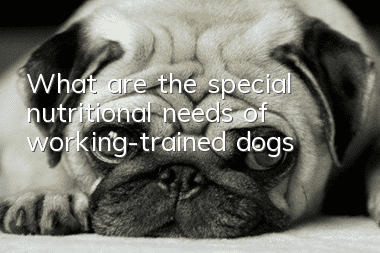What are the special nutritional needs of working-trained dogs?

With the increasing use of working dogs such as police dogs, search and rescue dogs, and explosive detection dogs, and the number of contacts with the public, this group has begun to receive people's attention and attention. Among working dogs, most are German Shepherd, Labrador, Malinois, Doberman, Springer Spaniel and other breeds.
As a working training dog, its nutritional needs are different from those of ordinary pet dogs due to several factors:
1. Dog training requires a certain intensity of training every day and a large amount of exercise (research shows that it is 50%-200% more than pet dogs);
2. The stress response of training dogs is large. Working dogs need to work under various complex conditions, such as noisy environments, bad weather conditions, and long-term overload work. These sudden changes in environment and physiology will cause stress to dogs. Exciting reaction;
3. Frequent contact with toxic and harmful substances. Such as drug detection dogs and explosive detection dogs;
4. Because working dogs are on call at any time, they cannot guarantee regular work, rest and eating.
Based on the above reasons, the nutritional needs of working dogs are more stringent.
High energy requirements
——Working dogs have significantly higher nutritional requirements than pet dogs. Therefore, to provide high-quality and high-energy feed, it must be rich in carbohydrates, animal protein and animal fat.
Joint protection
——Due to the high-intensity training and workload of working dogs, which require high limb strength and health, it is necessary to pay attention to whether their rations contain nutrients such as chondroitin sulfate and glucosamine that are beneficial to bone strengthening.
Nervous system maintenance and strengthening
——Working dogs are in a state of stress for a long time, and it is very important to display their intelligence and agility during training. Therefore, adding rich DHA and ARA to their rations is very beneficial to the development of their brain and nervous system.
Enhancement of cardiopulmonary function
——High-intensity and overload training of working dogs will cause certain damage to their heart and lungs. It is also necessary to add glycosaccharides, taurine and other substances that can help enhance heart function in their rations.
To sum up, it is very important to choose the right ration for working dogs. The nutritional ratio of ordinary dog food on the market cannot meet the needs of working dogs. It is understood that the actual feeding amount of ordinary dog food for working dogs often exceeds the reference amount. 50% - 100%. Regardless of nutrition or long-term benefits, special working dog food must be selected for working dogs.
【Tips】
1. Before training or using working dogs, in order to ensure their excitability and prevent defecation during working hours, only a small amount of food is generally fed, and the dog cannot feel full.
2. After training, the dog should be fully rested before feeding, and the meal should account for 2/3 of the whole day's needs.
3. Ensure that dogs have clean drinking water at all times.
4. If a working dog cannot be trained or used normally for a long time, the feeding amount should be reduced accordingly to avoid causing the dog to become too obese. Article source: Remi Gao Pet Official Account
- What are the benefits of neutering your dog?
- Treatment and Diagnosis of Dog Food Poisoning
- What medicines can be used for fungal skin diseases in dogs?
- Why should female dogs be sterilized? What should we pay attention to when neutering female dogs?
- What foods can pugs eat?
- What should I do if my dog’s limbs are weak and he can’t stand up?
- When is the best time for golden retrievers to mate? What should you pay attention to when mating?
- Three steps to eradicate fleas—early prevention, frequent observation, and quick treatment
- Chow Chow Class|Chow Chow Oestrus Time|Cycle|Signs|Reproduction
- Why is the dog drooling?



